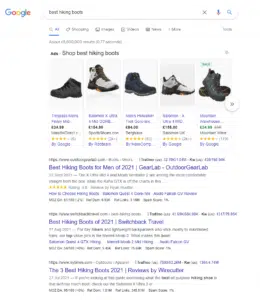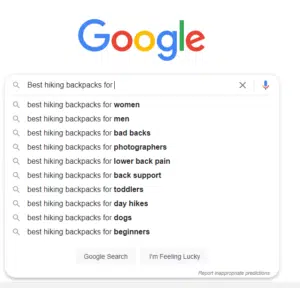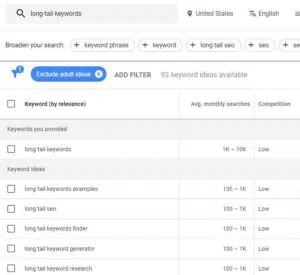Launching an affiliate site in the right niche is a good start. But, to succeed in this industry, you need to attract high-quality traffic to it.
And, that means optimizing your blog posts for the right search queries. Keyword research is a crucial part of an affiliate SEO strategy.
One of the first steps in keyword research is to find the phrases or words that people are typing into the Google search bar.
Then, you need to filter out the ones that are worth your time and investment. In this article, we’ll talk about long-tail keywords for SEO, a type that’s commonly overlooked.
What are Long-Tail Keywords for SEO?
Long-tail keywords are search terms that can be 2 to 5 words long.
Because these keywords are long, they are pretty specific in nature and have a lower search volume compared to their short-tail counterparts.
This can make you think “Why should I focus on a search term that has a low search volume?” “Why not a phrase that’s searched more times?”
There is a lot of competition for keywords with high search volumes. For a relatively new affiliate site that has a low authority, it would be virtually impossible to outrank the big fish on Google’s first page.
Long-tail keywords for SEO are preferred mainly because of two reasons:
- Your blog posts tend to rank easier and higher in the SERPs for these keywords
- There is a higher chance of generating conversions for long-tail keywords as they are more specific
The interesting thing is, when you put things in a larger perspective, long-tail keywords actually have more search volume than short-tail ones.
According to Moz, long-tail keywords account for 70% of the total search volume all around the world.
So, by targeting long-tail keywords for SEO, you are:
- Increasing your chances of generating affiliate sales
- Targeting a larger portion of the market
A win-win, right?
Related: Affiliate Marketing Tools
Long-Tail Keywords for SEO – Competition Analysis
Let’s say your ultimate goal is to rank for “Best hiking boots”. To get an idea about the competition, do a simple Google search for the term.

Source: Google.com
There are 114 million search results for that term alone. Plus, you can see big names ranking on the first page.
So, you have pretty much zero chance of ranking for that keyword, at least for a very long time.
However, if you go for a keyword that’s not that broad and has more words in it, you improve your chance, for instance, “Hiking boots for wide feet women”.
The long-tail keyword is targeted to women that have wide feet and are hikers. Plus, the key phrase has lesser search results.

So, as a general rule, the more specific you get with a search query, the better your chances of attaining the first page Google rank.
Let’s now address a more important question “How do you find long-tail keywords for SEO?”.
You May Also Like: Best Affiliate Programs For Beginners
Finding Long-Tail Keywords for Affiliate Marketing
While finding these keywords is not rocket science, it can be tricky, especially when you are new to keyword research. You don’t want to pick up a keyword that’s already targeted by authority blogs.
A simple and free way to create a list of relevant long-tail keywords for SEO is by using the good old Google search.
Just type in anything you want to talk about and observe the auto-suggestions Google generates.

See? Here is a long list of blog post ideas for you. But, don’t just stop there; hit enter and keep scrolling until you reach the end of the page.
You’ll find a list of keywords in the “Related searches” section as well.

The good thing is, you can trust this information as it comes straight from the horse’s mouth.
But, that’s not it. The “Please also ask” section on a Google search results page is another great resource for relevant keywords.

Just by going through Google’s first page, you can get an extensive list of long-tail keywords. You can create a lot of content by using a simple Google search. But, for effective keyword research, you shouldn’t stop there.
Related: Best Affiliate Marketing Courses
Examine Your Competition
Your competition can be your guide. Examining the type, quality, and quantity of their content can help you get ahead of them.
Again, all you have to do is a quick Google search and you’ll see your competitors. Just keep in mind that as a new blog owner, your competition is with relatively new websites.
Keyword Tools to Find Long-Tail Keywords for SEO
Let’s talk about some free and incredible keyword research tools that you can use right now.
Google Keywords Planner

Although Google Keywords Planner is geared towards pay-per-click advertising, you can use its data for your SEO efforts as well.

A tip: Google doesn’t show the exact monthly searches for keywords unless you are running a paid campaign. So, if you can afford to run a small campaign, it would show you the exact (almost) search volumes of your keywords.
But, although Keyword Planner is a great resource for brainstorming keyword ideas, the data it offers can be limited.
So, it’s a good idea to explore other tools as well. After all, keyword research is one of the most important aspects of on-page SEO.
Let’s move to our next tool.
Answer The Public

This one is another great free tool to find long-tail keywords for SEO. It gathers the data from Google and other search engines and presents it in a creative way.
To get a ton of keyword ideas, all you need to do is enter your primary keyword or a related term and click “Search”.
Here is what it fetches for the phrase “Long-tail keywords”.

You can view the list of keywords in the data mode as well.

Ubersuggest

Ubersuggest is one of the best free keyword research tools out there, mainly because:
- It provides monthly search volumes and SEO difficulty of a keyword
- It lists related keywords with the same insightful data
- You can export the list of keywords in a CSV (excel) file and work on your keywords later
Let’s take a look at the data it fetches for the keyword “Long-tail keywords”.

It’s important to mention that you shouldn’t go for a keyword simply because it has a good search volume.
The SEO difficulty score is an important factor to consider. The higher this score, the more difficult it will be to rank for that keyword.
Manually Checking a Keyword’s Difficulty
Examining Google’s first page competitors is also important as your aim should be to rank there.
After selecting a keyword from a tool like Ubersuggest, do a simple Google search for it.
Look at:
- The domain age of the websites ranking on the first page against your target keyword
- The backlink profile, domain authority, and page authority of your competitor’s blog
You can use MOZ’s free browser extension to find out the DA (domain authority) and PA (page authority).

Of course, the higher the PA and DA of search results, the more difficult it would be to outrank that domain.
Also, see if there are any brands ranking for your target keywords. You don’t want to compete with established brands in your industry.
If you see social forums like Quora and Reddit ranking against a keyword, congratulations, you’ve found a perfect keyword to target.
Word Tracker
![]()
Word Tracker is another freemium keyword research tool. You can use it for free by signing up for the trial account and see if it’s worth your buck or not.
It tells you the keyword search volume and its SEO difficulty.
Keywords Everywhere

You can get a lot of keywords with insightful data from Keywords Everywhere.
It is one of the most cost-effective tools to find long-tail keywords. According to the company, the extension shows data from Google Keywords Planner and Clickstream.

The good thing is, you don’t have to spend through the nose to be a premium Keywords Everywhere user.
The pricing structure of the extension is based on credits, which don’t expire for a full year.

You get 100,000 credits (1 credit = 1 keyword) for an entire year. This is impressively cost-effective compared to other keyword research tools out there.
Long-Tail Keywords for SEO – Writing Content
Your ultimate goal as an affiliate marketer is to generate affiliate sales. And, your blog’s content is the only thing that can drive that action from the visitors.
Creating high-quality, relevant, and valuable content is a must, no matter what type of online business you are running.
So, after finding the right long-tail keywords for SEO, you need to put some effort into producing great content around them.
Before you expect your target audience to buy from your content, you need to build trust and rapport with them.
Here are a few tips for writing affiliate marketing content:
Optimize the Keyword Density
Keyword stuffing is not only damaging to your post’s search-engine performance but it can also affect conversions negatively.
The optimum keyword density of a blog post is around 2%. Avoid using a target keyword more than 2% of the total word count of your post.
Plus, you don’t want to make it obvious to your readers that you are targeting a keyword. The content should flow naturally.
Be Honest
If you are reviewing products, you should be honest about them with your readers.
Whether it’s a flaw or a missing feature, if you are honest about it, you build trust and rapport with your audience.
Skimmable
Most people don’t like to read every word of a blog post; they prefer getting relevant information quickly.
What you can do is, make your content skimmable. Including subheadings in your blog posts is an effective way to make your posts easier to consume.
Long-Tail Keywords for SEO – Analyzing and Improving
Implementing an SEO strategy is only part of the process; you need to track your results to keep moving in the right direction.
You want to see if you are investing your resources in the right long-tail keywords. And, that’s more than doing a Google search and exploring the search results for your article.
Fortunately, there are a couple of free and effective tools to help you track your progress.
Google Search Console and Google Analytics
You can leverage these two free and powerful tools to track how users and search engines interact with your blog.
Organic search traffic: This one tells you how many visitors land on your web pages via a search engine. It can help you identify which keywords are most effective and which are not.
Click-through rate: It’s awesome to rank on the first page of Google for a long-tail keyword. But, it would be a waste if nobody clicked on your link.
Track your CTR with Google Search Console; if it’s low, include your long-tail keyword in the title and meta description.
If it’s already present, consider writing a better copy for your title and description.
Plus, make sure that your content and the user intent align with each other.
Bounce rate: A high click-through rate is great. But, what if most of them hit the back button right after landing on your page?
You can track your bounce rate in Google Analytics; aligning your content with the user intent is one of the solutions to a high bounce rate.
You May Also Like: Best Niches For Affiliate Marketing
Final Thoughts
Your success with an affiliate blog depends a lot on what type of content you produce. As an affiliate marketer, publishing highly relevant content should be your top priority.
Fortunately, you can do that by targeting long-tail keywords. You can find these search terms by using a number of free and paid tools:
- The good old Google search
- Google Keyword Planner
- Ubersuggest
- Answer the Public
- And, more
After finding a good keyword, make sure to check its competition by observing Google’s first page results.





